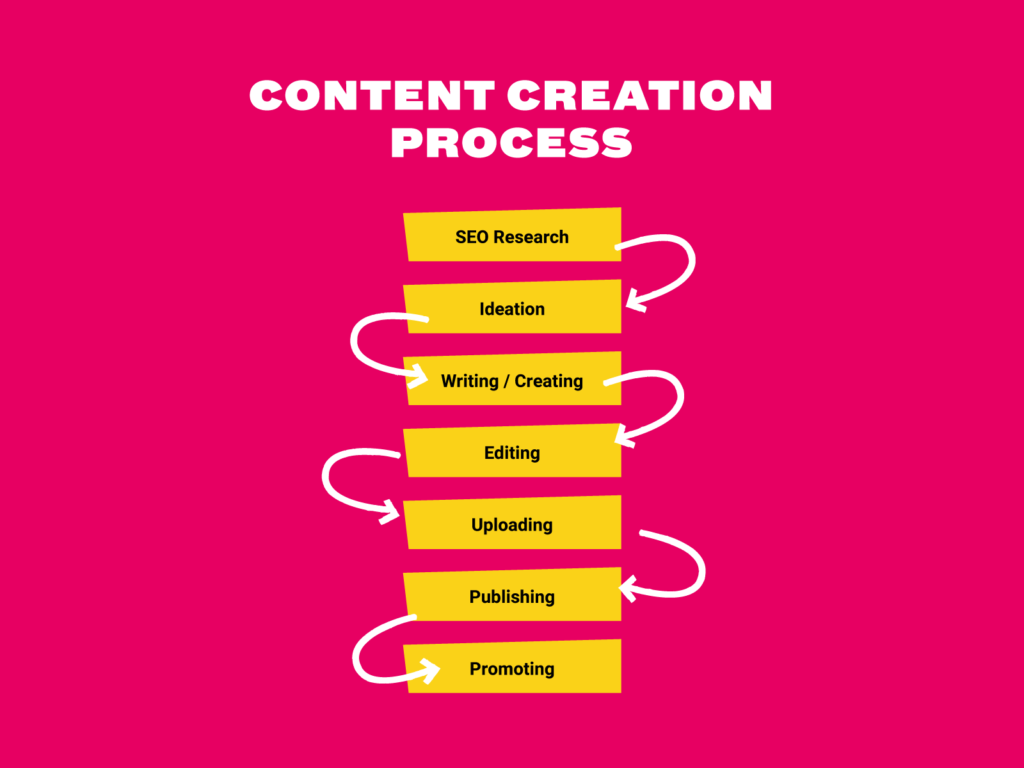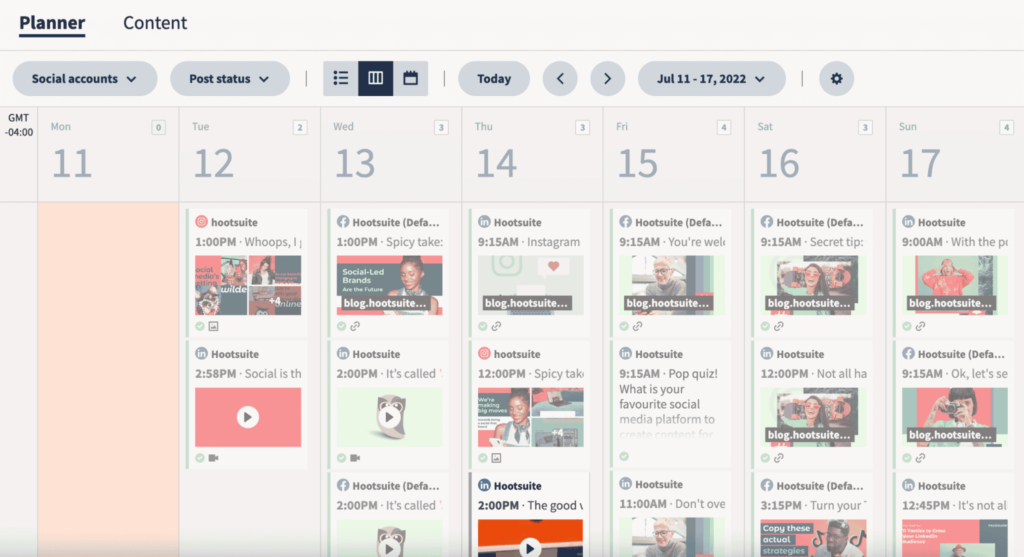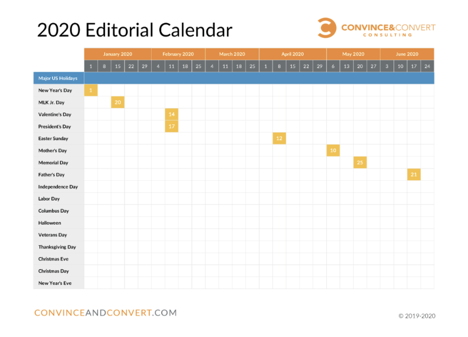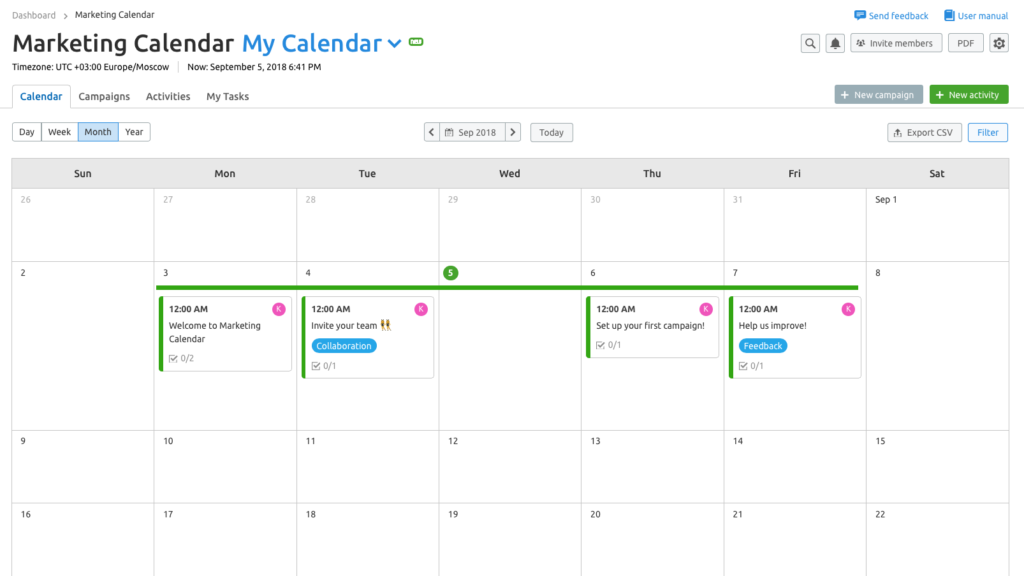Choosing the right content calendar software is a critical and difficult task in your content marketing, especially when you consider that the average internet user spends just shy of seven hours a day on the internet! That’s a lot of time for people to be browsing the internet, and you want to make sure your content grabs some of their screen time.
A content calendar will help you schedule and distribute your content, but only the best content calendar software will help you rise to the top of Google’s search pages.
In this article, we are going to discuss what a content calendar is, why you need it, how the right software can smooth your workflow, and how to choose the right content calendar software for your needs.
What Is Content Calendar Software?
At the most basic level, content calendar software helps with your content scheduling. Typically, these are used as a social media content calendar to make sure you can create, batch, and schedule across a variety of social media accounts.
Some content calendar tools might also include content management, which can be huge to streamlining your content creation process. Either way, the automation of this process is where a content calendar shines. Which probably clues you into why they are so important.
Why Do You Need a Content Calendar?
You need the right content calendar software because it smooths out your content marketing workflow. If you have any type of content strategy, then you are going to be working on social media content, project management calendars, and editorial calendars, and doing it all while working across a variety of marketing platforms.
It all adds up and can be a chaotic organizational nightmare.
That’s why you need a content calendar that can pull in both content and calendar templates, has access for team members to work on content asynchronously, and, most importantly, organize the content planning stage of calendaring.
For some concrete examples, let’s consider what you might need for your social media marketing calendar, an editorial calendar, and a project management calendar.
Social media marketing calendars
For a social media content calendar, you will need some specific ways to visualize and categorize the big picture of your social media content:
- You need to be able to see an overview of how media content will look for platforms like YouTube, TikTok, and Instagram.
- You will need to be able to drag and drop these ready-to-go content pieces in real-time to nail the best time to post.
- You will need access to multiple social profiles and social media platforms on the same calendar.
- Then, you will need to be able to create customizable templates for your various marketing team members to use.
That is a lot to pack into content calendar software for that bird’s eye view approach. You will need a social media management tool that can do a little bit of everything and sync up well with your content creation process.
Editorial content calendars
For those involved in creating a content marketing strategy centered around SEO and conversions, there will be a different set of needs and expectations for content calendar software:
- You will need to be able to track due dates for every step of the process.
- You will want to keep track of content ideas across several platforms.
- You have to be able to create interactive feedback loops in real-time with content creators and freelancers.
- You need to be able to track the metrics for time to complete a content piece, calculate how long it took to optimize for launch, and curate the social media posts you want to create around that particular piece of content.
There is a lot to organize and keep track of within an editorial calendar, but you will also always want to keep track of where the content falls within the greater scheme of the content strategy. Finding the perfect content calendar software for these tasks is critical to the success of your marketing team.
Project management calendars
Now, let’s assume you need to manage various projects from LinkedIn social media posts to WordPress blog posts to product launches and updating ecommerce shops. You need to manage a lot more moving pieces at an even higher level.
- You will need access to content calendar templates and social media calendar templates that can also fit within your project management calendar.
- You will need access to a calendar view of the final due dates of each project so you can always see the big picture behind your content strategy.
- You will need a bit of functionality from many other content calendar types.
- And you will, of course, need task management.
Many project management tools look at various features that fit within some of the other content calendar types. The difference, though, is the need to visualize everything in terms of due dates, final result projects, and the ability to schedule and publish content alongside a well-trained marketing team.
4 Ways Content Calendar Software Can Help Your Content Creation Process

You need to track many tasks, whether you are looking at social media posts, content projects, or even product launches. The question is: How is any of this better than simply using an Excel sheet?
The right content calendar software can help you identify content gaps, help plan for critical moments, help give you ample time to get content ready and replace several other tools and software to keep everything tidy.
1. Identify content gaps
Whether you are looking at social posts or blog posts, you will need to look for ways to curate content ideas.
A content calendar geared towards your needs will help you lay out your content pieces and determine where you might find some wiggle room for more content.
If you can see that, over the next three months, you will generate a lot of content about a specific topic. Then you might be able to find holes for social posts or an opportunity for a blogger to create a guest post on your website that you otherwise might have missed in the daily grind.
Taking a step back and looking at your content calendar for the next 12 months can give you a good idea of where you can generate even more content to fill out your calendar and bring valuable insights to your customers and clients.
2. Plan for key events, dates, and launches
If you are constantly only looking one month ahead, then it is easy to completely overlook something that appears on Google Calendar when you also have to manage three Trello boards, two Asana teams, collaborate with management on Microsoft Teams, and also figure out where you can use HubSpot to pick up the slack.
A high-quality content calendar can help you take a long-term approach by managing tasks and content year-to-year instead of month-to-month.
This gives you time to prepare for important events, dates, and launches well in advance so that you aren’t caught off-guard and scrambling to finish projects in time.
3. Give yourself ample time to get content ready
This brings us to the ability of great content calendar software to give you the breathing room to get content ready for publication. Even social networks you post on regularly can be moved to the back of your mind if you don’t give yourself time to prepare content.
Having content calendar software in place allows you to focus on the content marketing strategy rather than becoming mired in the details and minutiae of every single project.
4. Replace multiple tools and software
One of the most significant benefits of finding the right content calendar for your specific needs is the ability to declutter your content creation process. You may have everything synced across a massive Google Sheet, but that will not cut it in the long run.
Your calendar needs are going to expand beyond the scope of what many free tools have to offer. While you may be able to string five or six content calendar tools together to make something work, you need Frankenstein’s monster of hobbled-together parts and pieces.
Replacing multiple tools with one high-quality content calendar software tool will make your life a lot easier with fewer moving parts to manage.
3 Examples of Content Calendars
Having a visual and seeing a content calendar template in real life can help solidify how these content calendar tools could work for your brand.
Here are a few examples of great content calendar templates for a few different types of content.
Social media marketing template: Hootsuite

Hootsuite’s content calendar template is a great example of how to lay out content visually so you can see what kind of social posts are going out on behalf of your brand.
This lets you see what content is going out on what day, opportunities where content can overlap, and even give you a better idea of ways you could repurpose content for different audiences.
- Easy to visualize content ideas.
- Simplifies the way to identify content gaps.
- Outlines visual vs. written content posts.
Editorial content calendar template: Convince & Convert

Convince & Convert offers a great example of an editorial content calendar because it is specifically designed around key events, dates, and launches. This allows you to start with the biggest projects on your calendar and build content around and pointing toward these major events.
- Clearly defines major events to build content around.
- Enables you to prioritize content ideas for specific upcoming events.
- Provides a bird’s eye view of upcoming content calendar events.
Project management content calendar template: Semrush Marketing Calendar

Semrush offers a template utilizing their Marketing Calendar software that offers an example of how the right content calendar can make all the difference.
The template showcases how you can include all of your significant steps at the highest calendar view, and how you can break down the various social posts, articles, and other tasks.
- Visualizes tasks based on due dates.
- Tasks can be seen as completed or not from within the calendar view.
- Projects and calendars can be overlapped to make assessing project management needs simple.
How to Choose the Right Content Calendar Software?
While there are dozens of content calendar software options we have narrowed our list down to some of the best of the best.
You can see our curated list of our 10 best content calendar software choices, but here we will give some of our favorite content calendar tools based on their use cases.
For social media content: Loomly
- Loomly excels at content idea generation.
- Curate social posts based on your content marketing strategy.
- The ability to schedule posts to multiple social media platforms within Loomly.
- Create content based on trending hashtags and keywords.
For editorial content: Mediatool
- Mediatool excels at connecting content pieces with calendar projects.
- Metrics for published content can be easily viewed within Mediatool.
- Strategic planning features like figuring out ad spending, time spent on projects, and content ideas to feed off your best content pieces.
- Mediatool helps all marketing team members see which content pieces are succeeding and then figure out how to duplicate that success.
For project management: Wrike
- Wrike utilizes dashboards to see everything at a glance, making assessing workflows far more efficient.
- Workflow automation makes the content creation process even smoother.
- Integrations with common tools like Google Drive and WordPress.
- Easily share specific projects with simple links rather than explaining where a specific task can be found.
Need expert help selecting the right Unified Communications Software?
We’ve joined up with Crozdesk.com to give all our readers (yes, you!) access to Crozdesk’s software advisors. Just use the form below to share your needs, and they will contact you at no cost or commitment. You will then be matched and connected to a shortlist of vendors that best fit your company, and you can access exclusive software discounts!
Make Your Content Creation Process Flow with a Content Calendar
Finding content calendar tools isn’t difficult. Finding the right content calendar tool is the tricky part. This article has outlined some areas where you can see your most significant need and choose a calendar that meets those needs.
Choosing the right content calendar software can be the difference between finishing projects on time and within budget and adding 10 hours to your week to ensure you meet your due dates and complete your projects.
Check out our Tools section to learn more about software to streamline your content efforts.
And if you want essential content delivered straight into your inbox to help grow your brand faster, subscribe to Indie Media Club now.



